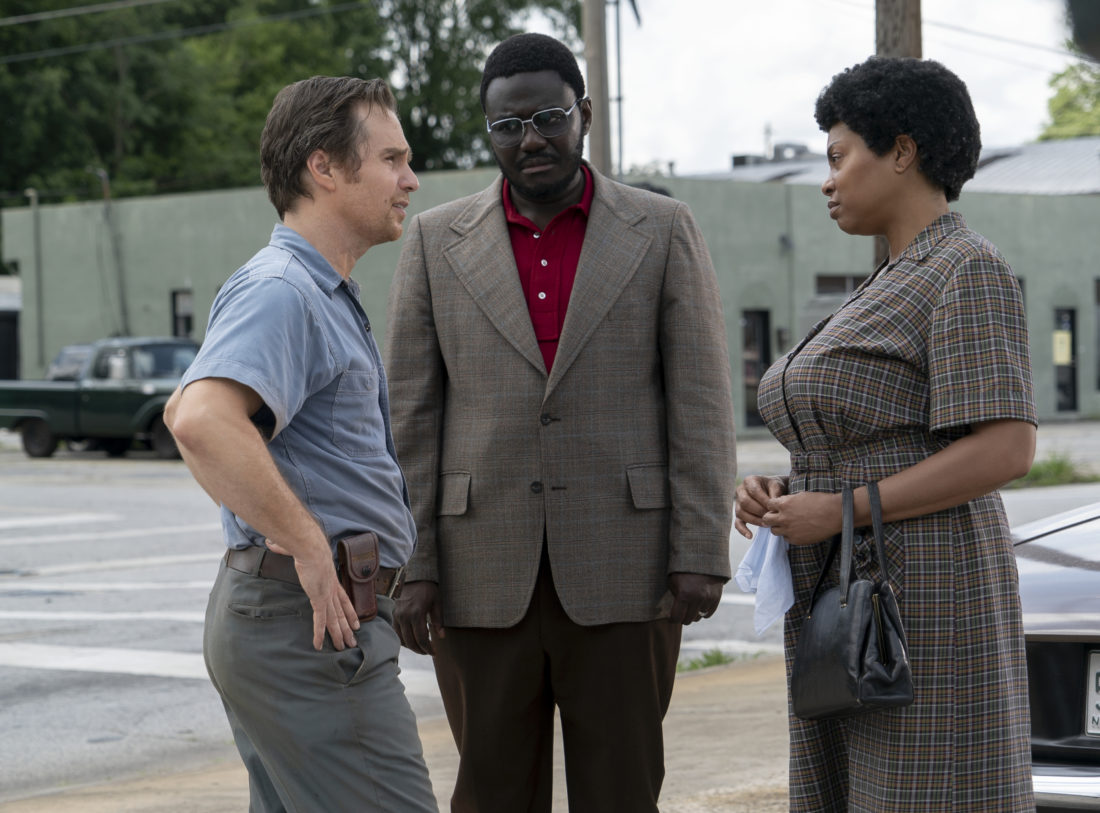Spoiler alert: The only “best” that should be associated with The Best of Enemies is the title itself. Awful and infuriating, it squanders not only the talents of lead actors Taraji P. Henson and Sam Rockwell but also of the true story of Ann Atwater, a community organizer who fought courageously for the civil rights of black Durham residents until her death in 2016 at age 80.
Set in 1971, the film centers on how, or whether, to desegregate the local white school after the school that black students are forced to attend catches fire. After a series of political machinations, a cowardly judge orders the community to develop its own plan for how to handle the schools issue. Atwater (Henson) and local Ku Klux Klan leader C.P. Ellis (Rockwell) are assigned to co-chair a series of community meetings, leading to a final vote that will decide whether or not to integrate the schools.
Henson is clearly all in on the role of Atwater, and everything about her portrayal is the opposite of Cookie Lyon, the luxury-soaked, narcissistic matriarch she plays on the TV show “Empire.” From head to toe, from her accent to her stance and her stride, Henson puts in work. Sometimes it smacks of scenery chewing, though at no point does it come across that she’s anything but dedicated to respectfully channeling Atwater.
Still, rather than giving Atwater a real story — she was a real woman, after all — we spend the majority of the movie seeing events from Ellis’ point of view. Precious few scenes occur with Atwater in her home, with her children or with the black community that she so powerfully mobilizes to fight for justice and whom she clearly loves. We don’t get to see what truly motivates her since it all gets boiled down to a silly bumper sticker explanation of “It’s what I do.”
The fact that we never find out why she does what she does is an unbelievable oversight and the main reason I hate this movie. Instead, we spend time with Ellis in his home, with his family, at his gas station and with his KKK buddies — one of whom constantly wears a Confederate soldier cap while ominously smoking a cigarette. Talk about heavy-handed — and dumb.
Every other word out of Ellis’ mouth seems to be the N-word (one of the film’s few seemingly authentic details). He refuses to sell gas to black people, even if it means his family can’t pay bills. His propensity toward violence is displayed in a scene where he and fellow KKK members joyfully shoot up the home of a white woman whose crime is having a black boyfriend. And certainly, he doesn’t care that black children are choking on ash and cinders just to attend school.
And yet, director Robin Bissell (producer of The Hunger Games and Seabiscuit) also tries to position Ellis as doltish, verging on lovable. When Atwater’s daughter looks at Ellis fearfully during a tour of the burned-out black school — which the kids are still forced to attend — he’s shocked that she looks at him like he’s “a monster.”
Ellis, we learn, once dreamed of being a pro baseball player. He also has a hospitalized son with special needs, through which Ellis gets to display his tender side. (Rockwell doesn’t quite pull a Shirley MacLaine in Terms of Endearment — “Give my daughter the shot!” — but he comes darn close.)
Additionally, he’s married to his high school sweetheart, played by Anne Heche in a cardboard, “stand by your Klansman” role, squandering her talents in the service of such bland exchanges as telling Atwater about her husband’s former good looks and how he’s doing the best he can.
The Best of Enemies may be “based on a true story,” but that doesn’t excuse the director’s choice to center Ellis as the object of our compassion and to make Atwater and the whole black community of Durham supporting characters in their own lives.
The movie is far too focused on what white people will do to “give” black people justice, rather than on black people being agents of our own stories and architects of our own freedom. What fails is not the story itself, but how it’s told. Atwater, and perhaps Ellis, too, deserve far better.




Before you comment
The comments section is here to provide a platform for civil dialogue on the issues we face together as a local community. Xpress is committed to offering this platform for all voices, but when the tone of the discussion gets nasty or strays off topic, we believe many people choose not to participate. Xpress editors are determined to moderate comments to ensure a constructive interchange is maintained. All comments judged not to be in keeping with the spirit of civil discourse will be removed and repeat violators will be banned. See here for our terms of service. Thank you for being part of this effort to promote respectful discussion.